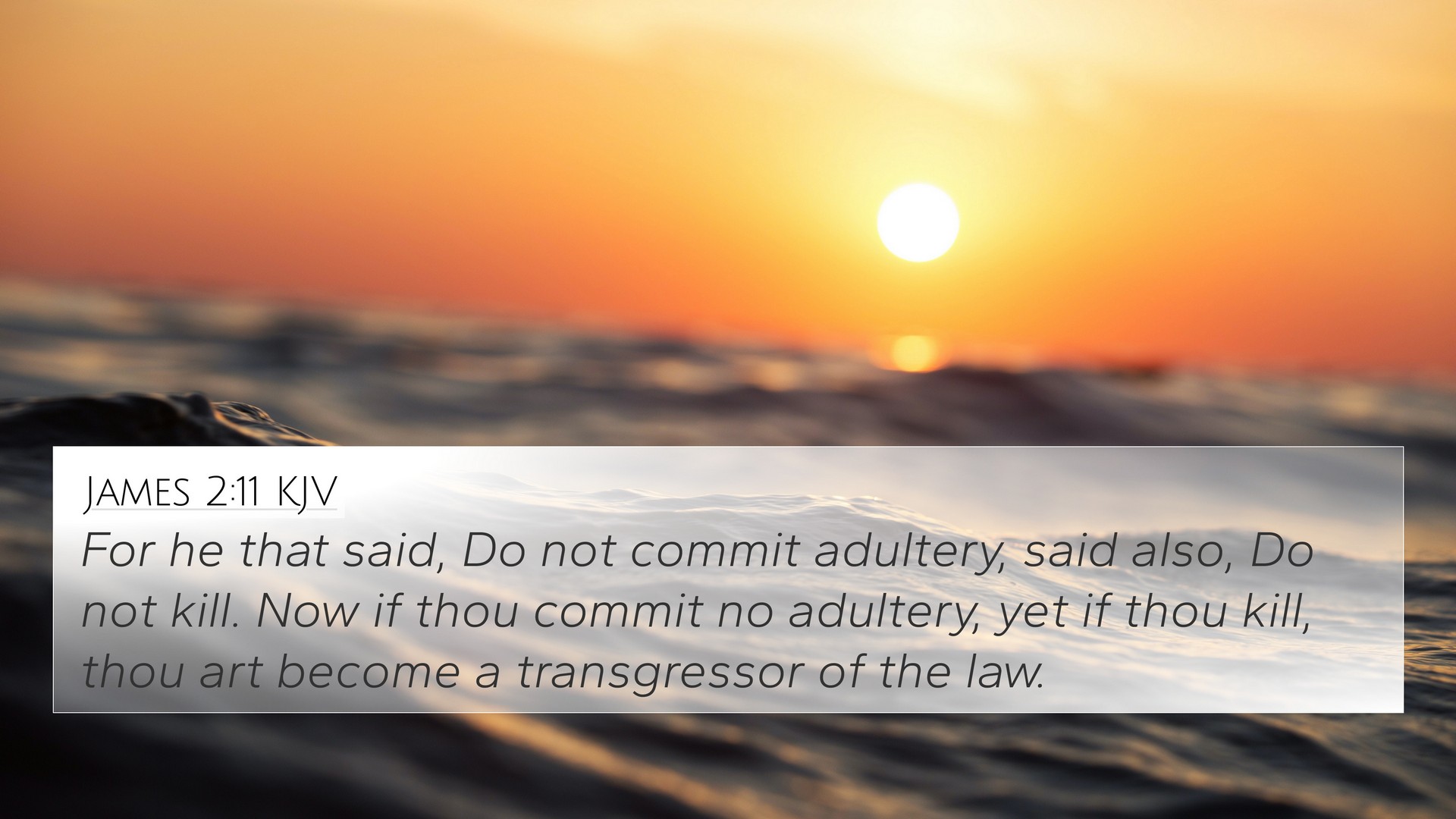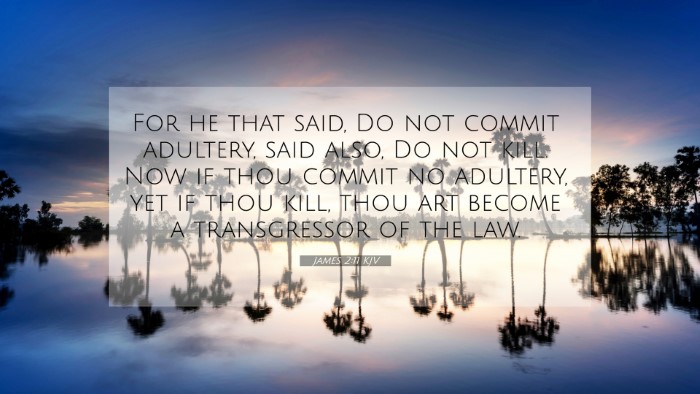Old Testament
Genesis Exodus Leviticus Numbers Deuteronomy Joshua Judges Ruth 1 Samuel 2 Samuel 1 Kings 2 Kings 1 Chronicles 2 Chronicles Ezra Nehemiah Esther Job Psalms Proverbs Ecclesiastes Song of Solomon Isaiah Jeremiah Lamentations Ezekiel Daniel Hosea Joel Amos Obadiah Jonah Micah Nahum Habakkuk Zephaniah Haggai Zechariah MalachiJames 2:11 Similar Verses
James 2:11 Cross References
For he that said, Do not commit adultery, said also, Do not kill. Now if thou commit no adultery, yet if thou kill, thou art become a transgressor of the law.
Uncover the Rich Themes and Topics of This Bible Verse
Listed below are the Bible themes associated with James 2:11. We invite you to explore each theme to gain deeper insights into the Scriptures.
James 2:11 Cross Reference Verses
This section features a detailed cross-reference designed to enrich your understanding of the Scriptures. Below, you will find carefully selected verses that echo the themes and teachings related to James 2:11 KJV. Click on any image to explore detailed analyses of related Bible verses and uncover deeper theological insights.

Matthew 5:21 (KJV) »
Ye have heard that it was said of them of old time, Thou shalt not kill; and whosoever shall kill shall be in danger of the judgment:
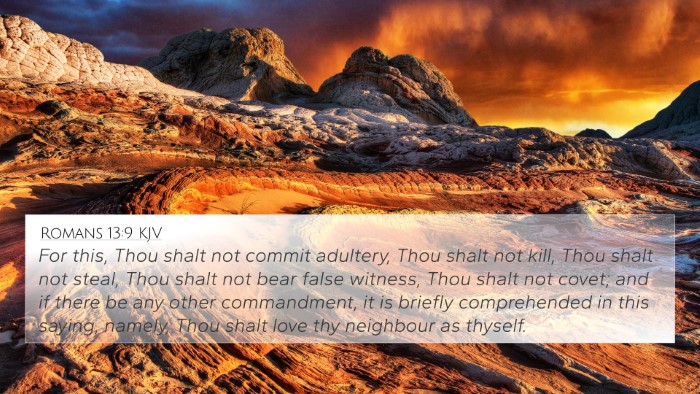
Romans 13:9 (KJV) »
For this, Thou shalt not commit adultery, Thou shalt not kill, Thou shalt not steal, Thou shalt not bear false witness, Thou shalt not covet; and if there be any other commandment, it is briefly comprehended in this saying, namely, Thou shalt love thy neighbour as thyself.

Matthew 19:18 (KJV) »
He saith unto him, Which? Jesus said, Thou shalt do no murder, Thou shalt not commit adultery, Thou shalt not steal, Thou shalt not bear false witness,
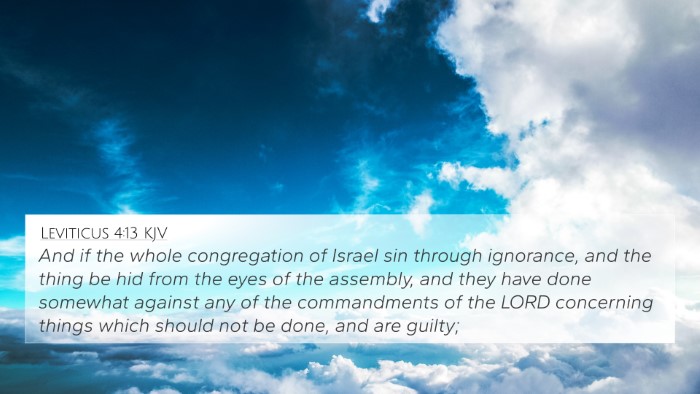
Leviticus 4:13 (KJV) »
And if the whole congregation of Israel sin through ignorance, and the thing be hid from the eyes of the assembly, and they have done somewhat against any of the commandments of the LORD concerning things which should not be done, and are guilty;
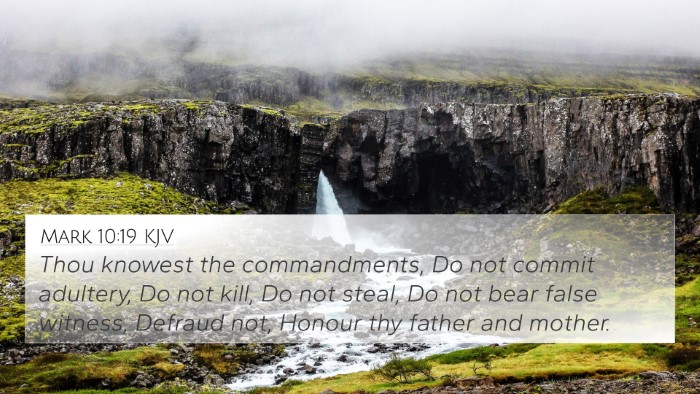
Mark 10:19 (KJV) »
Thou knowest the commandments, Do not commit adultery, Do not kill, Do not steal, Do not bear false witness, Defraud not, Honour thy father and mother.
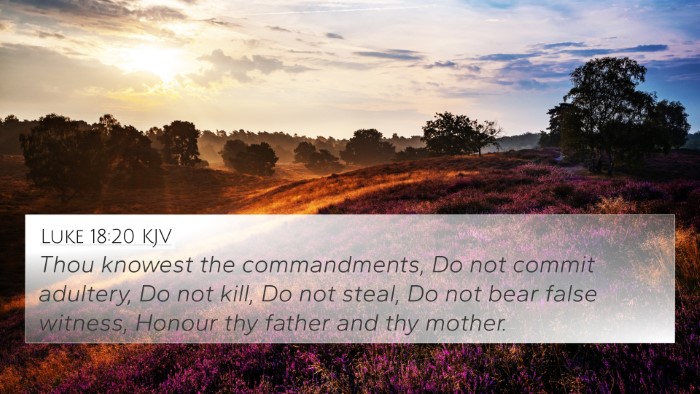
Luke 18:20 (KJV) »
Thou knowest the commandments, Do not commit adultery, Do not kill, Do not steal, Do not bear false witness, Honour thy father and thy mother.
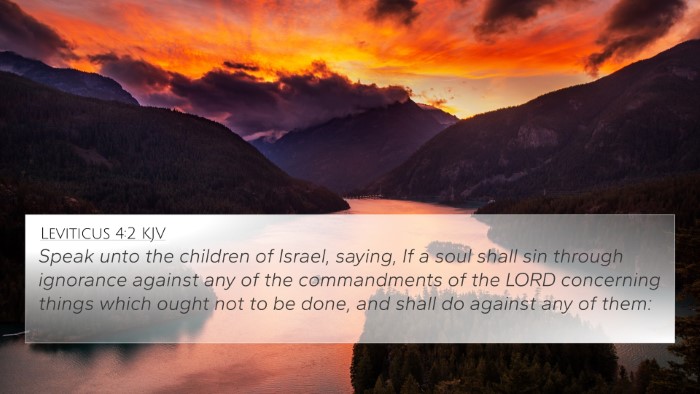
Leviticus 4:2 (KJV) »
Speak unto the children of Israel, saying, If a soul shall sin through ignorance against any of the commandments of the LORD concerning things which ought not to be done, and shall do against any of them:
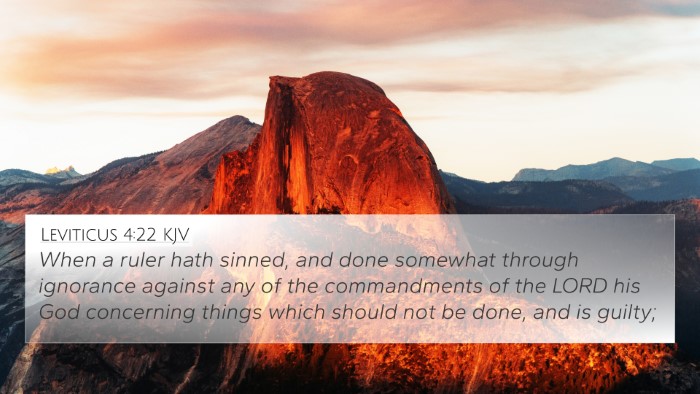
Leviticus 4:22 (KJV) »
When a ruler hath sinned, and done somewhat through ignorance against any of the commandments of the LORD his God concerning things which should not be done, and is guilty;
James 2:11 Verse Analysis and Similar Verses
Understanding James 2:11
James 2:11 states: "For he who said, 'Do not commit adultery,' also said, 'Do not murder.' If you do not commit adultery but do murder, you have become a transgressor of the law." This verse highlights the equal weight of all commandments given by God, emphasizing that breaking even one commandment renders a person guilty of transgressing the entire law.
Contextual Background
To understand the depth of this verse, it is essential to explore the context surrounding it. James, the author, addresses issues of favoritism and the overall behavior of believers in the community. The author emphasizes that faith must be actively demonstrated through actions, aligning with God’s commandments.
Insights from Public Domain Commentaries
-
Matthew Henry:
Matthew Henry emphasizes that all parts of the law are equally binding. He suggests that while one may refrain from certain sins, it does not absolve their responsibility to uphold all of God's commands. The unity of moral law means that violating one aspect is akin to violating them all, illustrating the comprehensive nature of God's will for righteous living.
-
Albert Barnes:
Barnes offers insight on the implications of this verse concerning moral responsibility. He notes that to commit sins such as murder after refraining from adultery does not diminish the severity of the transgression. This argument enhances the understanding of moral accountability, stressing that perceived lesser sins do not provide immunity from judgment.
-
Adam Clarke:
Adam Clarke analyzes the concept of the law in this scripture, drawing attention to how the Old Testament outlines a holistic approach to moral conduct. He asserts that any violation constitutes a breach of the law as a whole, reinforcing the interconnectedness of God’s commands, reinforcing the idea that God's law requires complete obedience.
Thematic Bible Verse Connections
James 2:11 intricately links to several other scripts, emphasizing themes of moral integrity and the necessity for comprehensive adherence to God’s commandments. Below are key cross-references that align with its teachings:
- Exodus 20:13-14: "You shall not murder. You shall not commit adultery." This includes the original commandments given to the Israelites.
- Galatians 3:10: "For all who rely on the works of the law are under a curse..." This connects to the discussion about the law and its implications for moral failure.
- Romans 3:23: "For all have sinned and fall short of the glory of God." A reminder of universal sinfulness and the requirement of grace.
- 1 John 3:15: "Everyone who hates his brother is a murderer, and you know that no murderer has eternal life abiding in him." Linking hate to murder emphasizes moral accountability.
- Matthew 5:21-22: Jesus teaches on the heart of the law, equating anger with murder, thereby extending the application of God's commandments.
- Romans 13:9: "For the commandments, you shall not commit adultery, you shall not murder..." Directly referencing the commandments, highlighting their importance.
- Luke 16:17: "But it is easier for heaven and earth to pass away than for one dot of the Law to become void." Reinforces the permanence of God's law.
- James 1:10-11: Discussing the rich and poor, emphasizing humility under the law and the transient nature of worldly status.
- John 15:14: "You are my friends if you do what I command you." The importance of obedience as evidence of a relationship with Christ.
- 1 Peter 2:16: Encourages living as free people while not using that freedom as a cover-up for evil, emphasizing moral integrity.
Comparative Bible Verse Analysis
In analyzing James 2:11 alongside other scriptures, we see a clear theme surfacing: the absolute nature of God’s moral law. Each cross-reference reinforces the idea that sin—regardless of its nature—holds serious consequences and requires repentance and obedience.
Connections between Bible Verses
The connections between these Bible verses also focus on essential themes such as justice, grace, and the call to holiness. They exemplify how different parts of Scripture work in harmony to provide a comprehensive framework for understanding God’s law and our ethical obligations as believers.
Conclusion
James 2:11 serves as a sobering reminder of the serious nature of God’s commandments. As believers, recognizing the interconnectedness of God’s laws not only shapes our moral compass but also emphasizes the need for reliance on grace through faith in Jesus Christ for righteousness. Understanding these connections enriches our faith and provides tools for Bible cross-referencing and deeper scriptural study.
